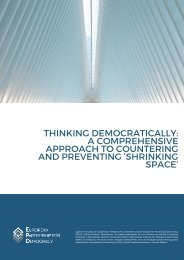Repression and resilience: Diagnosing closing space mid-pandemic
You also want an ePaper? Increase the reach of your titles
YUMPU automatically turns print PDFs into web optimized ePapers that Google loves.
20 REPRESSION AND RESILIENCE: DIAGNOSING CLOSING SPACE MID-PANDEMIC<br />
labour <strong>and</strong> caregiving tasks curtail the time that women<br />
can dedicate to participation in political life, including as<br />
political leaders.<br />
The lockdown itself was in some countries also gendered,<br />
by only allowing a particular gender to leave the house on<br />
specific days, like in Bogotá in Colombia for instance. This<br />
further strengthened gender roles <strong>and</strong> stimulated police<br />
brutality <strong>and</strong> discrimination against trans, non-binary,<br />
<strong>and</strong> non-hegemonic gender identities. Similar measures<br />
in Peru led to arbitrary arrests of transgender people.<br />
LGBTQI people were also subjected to police violence<br />
<strong>and</strong> increased discrimination related to the lockdown<br />
measures across case studies. In Kenya, LGBTQI people<br />
were evicted from their offices, as tensions related to<br />
stigma arose in the communities where they are based.<br />
At the global level, the p<strong>and</strong>emic has been employed<br />
by conservative forces <strong>and</strong> autocratising states as<br />
another opportunity to attack <strong>and</strong> marginalise the<br />
LGBTQI community, by identifying them as carriers of<br />
both disease <strong>and</strong> societal problems. As a case in point,<br />
LGBTQI people were subject to clearly targeted hate<br />
speech by political <strong>and</strong> religious leaders in 12 countries<br />
across Europe <strong>and</strong> Central Asia. 52<br />
Disadvantaged <strong>and</strong> marginalised communities<br />
The p<strong>and</strong>emic measures disproportionately affected all<br />
marginalised <strong>and</strong> disadvantaged communities across<br />
cases, by exposing structural inequalities <strong>and</strong> a hostile<br />
institutional <strong>and</strong> socio-economic environment for these<br />
communities. For instance, ethnic, racial <strong>and</strong> religious<br />
minorities contract <strong>and</strong> die from the virus as a result<br />
of systemic inequities that impact their health. A recent<br />
study found that Black Americans are 3.5 times more<br />
likely to die of COVID-19 than White Americans, while<br />
Latinx people are almost twice as likely to die of the<br />
virus compared with White people. 53 However, they do<br />
not seek help due to their insecure livelihoods as well as<br />
long-st<strong>and</strong>ing racism, xenophobia <strong>and</strong> scapegoating. 54<br />
Decades of exclusion <strong>and</strong> pre-existing barriers in access<br />
to healthcare, social security <strong>and</strong> education result in<br />
disastrous hardship for indigenous peoples - from food<br />
insecurity <strong>and</strong> destitution to higher mortality rates. 55<br />
In Colombia, the lack of state interventions aimed at<br />
protecting indigenous communities from the fast spread<br />
of COVID-19 in the Amazon has resulted in so many<br />
deaths that some small communities are now at risk of<br />
extinction. In addition, the compensation programme<br />
for Amazon communities was delayed <strong>and</strong> their access<br />
to education was strongly restricted due to low internet<br />
connectivity, a lack of access to computers <strong>and</strong> limited<br />
digital literacy.<br />
Prison populations were also hard-hit by the virus<br />
globally, <strong>and</strong> have as a result suffered inhumane<br />
treatment. The often overcrowded facilities <strong>and</strong> limited<br />
sanitary measures have led to many virus outbreaks<br />
in prisons around the world. In Colombia, a riot against<br />
the lack of anti-virus protections in one prison led to<br />
the death of 32 prisoners <strong>and</strong> injuries to 83 inmates.<br />
An Amnesty International report has shown that other<br />
prisons resorted to solitary confinement as an extremely<br />
radical social distancing measure <strong>and</strong> have significantly<br />
limited family visits or suspended them altogether. 56<br />
Migrants, refugees <strong>and</strong> displaced people face challenges<br />
in terms of inadequate housing, lack of access to<br />
essential services <strong>and</strong> information in their language,<br />
<strong>and</strong> discrimination. The risk of infection, exploitation <strong>and</strong><br />
human rights abuses is particularly high for migrants in<br />
52 ILGA-Europe (2020): COVID-19 impacts on LGBTI communities in Europe <strong>and</strong> Central Asia: A rapid assessment report. Available here.<br />
53 Gross, C. et al. (2020): “Racial <strong>and</strong> Ethnic Disparities in Population-Level COVID-19 Mortality”. J Gen Intern Med, 35(10): 3097–9.<br />
DOI:10.1007/s11606-020-06081-w.<br />
54 Minority Rights Group International (2020): Inequality <strong>and</strong> the impact of COVID-19: How discrimination is shaping the experiences of<br />
minorities <strong>and</strong> indigenous peoples during the p<strong>and</strong>emic. Available here.<br />
55 For more information on these trends, see UN DESA (2020): The Impact of COVID-19 on Indigenous Peoples. Available here; <strong>and</strong> IWGIA<br />
(2020): The impact of COVID-19 on indigenous communities: Insights from the Indigenous Navigator. Available here.<br />
56 Amnesty International (2021): Forgotten Behind Bars: COVID-19 <strong>and</strong> prisons. Available here.

















